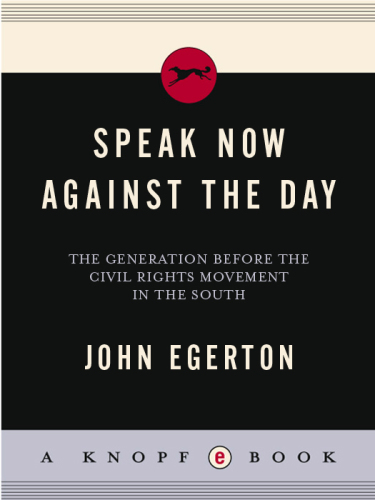
Speak Now Against the Day
The Generation Before the Civil Rights Movement in the South
- اطلاعات
- نقد و بررسی
- دیدگاه کاربران
نقد و بررسی

October 3, 1994
Egerton, author of several books on Southern culture and history (Generations), has put together a sprawling history of the South from 1932 to 1954-the Depression to the landmark Brown desegregation decision. His title derives from Faulkner's lament against Southern white intransigence, and his underlying question is: why wasn't change grasped sooner? Egerton answers by probing the writings of infrequently daring intellectuals (Myles Horton and Don West of Tennessee's Highlander Folk School were among the few real radicals) and often-reactionary politicians (``feudal barons'' like Virginia Senators Carter Glass and Harry F. Byrd), describing the modernizing impact of radio and roadways, and charting cataclysms like the New Deal and WWII. He captures neat anecdotes: the white director of the University of North Carolina Press, who commissioned the 1943 book What the Negro Wants, was shocked by black demands for equality. Egerton's near-encyclopedic approach, surveying lists of academics, writers, organizations and institutions, makes his book read like a compendium, but given his ambitious topic, he has done yeoman work to recapture an era. Photos not seen by PW.

November 15, 1994
Native Southerner Egerton (Shades of Gray, LJ 10/1/91) details a rich historical narrative of black and white Southerners opposing white supremacy during the 1930s and 1940s. Egerton superbly weaves descriptions of social and intellectual ferment, politics, and culture (e.g., literature, religion, music) into a coherent synthesis. He explains why the South failed to dismantle white supremacy when the possibility existed for voluntary, peaceful social reform. Egerton excoriates the crude, anti-democratic, self-serving social elites and politicians who denied human rights to black Americans. His book is a tribute to those black and white Southerners who wanted racial equality when many white Americans preferred not to acknowledge that racism had corroded America. Strongly recommended for public and academic libraries.-Charles L. Lumpkins, Bloomsburg Univ. Lib., Pa.

October 1, 1994
Spanning the years 1932-54, Egerton's intensely detailed dissection of his native South covers its seemingly somnolent attitude toward civil rights before the "Brown" desegregation decision sounded reveille. Beneath the stasis of the Jim Crow regime, though, brave individuals bestirred complacent white supremos, who generally managed to remain united in defense of the status quo. Egerton often hangs his narrative on this theme of conservative unity/liberal disharmony, which culminates in the idea that an opportunity for ending segregation uncoerced by the North was missed after the war. With such a strong, sturdy structure in place, Egerton's prose almost effortlessly covers the impact of the New Deal and the political lay of the land, particularly the congressional barons who kept blacks separate and unequal for as long as they could. But Egerton's fluency builds on hard research, interspersed with lighter personal views about growing up a vaguely liberal white. Apart from politics and the fortunes of nascent civil rights organizations, other passages critique 20 years of journalism and the incomparable literary florescence of white and black writers. (The title lifts a phrase from a prescient Faulkner speech delivered a month before Rosa Parks refused to move to the back of the bus.) The signal service this engrossing chronicle provides is the historical resurrection of lawyers, scriveners, tenant-farm organizers, and everyday people who sweltered under segregation even as they cast about for ways to end it. A milestone narrative in civil rights history. ((Reviewed October 1, 1994))(Reprinted with permission of Booklist, copyright 1994, American Library Association.)




دیدگاه کاربران